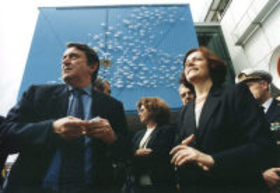European Capital of Culture

- Giuliano Gallanti, President of the Genoan Port Authorities (left) and Loyola Palacio (right) meeting in Genoa (Photo: European Commission)
European Capital of Culture
The Council launched the European Capital of Culture event in 1985, at the initiative of Greek Minister Melina Mercouri. The event has been used as an opportunity for the chosen city to showcase itself and to attract investment.
In 2000, the EU had no less than nine Cultural Capitals. After fears that the title was losing currency, the selection procedure was reformed and from 2005 onwards, only two cities will share the title each year.
The new procedure is based on a rotation principle, with individual EU member states able to suggest one or more Cultural Capitals for a particular year.
2 cities are European Capitals of Culture at a time. Countries are by law assigned a year in which to nominate a city. Chronology of host countries:
2004 Italy (Genova), France (Lille)
2005 Ireland (Cork)
2006 Greece (Patras)
2007 Luxembourg - Romania (Sibiu)
2008 United Kingdom (Liverpool) - Norway (Stavanger)
2009 Vilnius, Lithuania - Linz, Austria
2010 Essen, Germany - Istanbul, Turkey - Pécs, Hungary
2011 Turku, Finland - Tallinn, Estonia
2012 Guimarães, Portugal - Maribor, Slovenia
2013 Marseille Provence, France - Košice, Slovakia
2014 Sweden - Latvia
2015 Belgium - Czech Republic
2016 Spain - Poland
2017 Denmark - Cyprus
2018 Netherlands - Malta
2019 Italy - Bulgaria
Links
http://ec.europa.eu/culture/our-programmes-and-actions/doc413_en.htm
